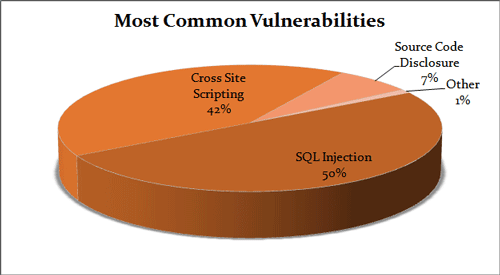我们的志愿者还没有将这篇文章翻译为 中文 (简体)。加入我们帮助完成翻译!
SQL injection takes advantage of Web apps that fail to validate user input. Hackers can maliciously pass SQL commands through the Web app for execution by a backend database.
SQL injection can gain unauthorized access to a database or to retrieve information directly from the database. Many data breaches are due to SQL injection.
How It Works

After entering username and password, behind the GUI the SQL queries work as follows:
"SELECT Count(*) FROM Users WHERE Username=' " + txt.User.Text+" ' AND Password=' "+ txt.Password.Text+" ' ";
Now suppose User enters the Username: admin and Password: passwd123, so after clicking on the Log in button, SQL query will run as follows:
"SELECT Count(*) FROM Users WHERE Username=' admin ' AND Password=' passwd123 ' ";
If the credentials are correct, then the user is allowed to log in, so it's a very simple (and therefore insecure) mechanism. Hackers use this insecurity to gain unauthorized access.
Hackers use a simple string called a Magical String, for example:
Username: admin
Password: anything 'or'1'='1
After clicking on the login button, the SQL query will work as follows:
"SELECT Count(*) FROM Users WHERE Username=' admin ' AND Password=' anything 'or'1'='1 ' ";
Just take a closer look at the above query's password section.
Password=' anything 'or'1'='1 '
The password is not 'anything', hence password=anything results in FALSE, but '1'='1' is a TRUE statement and hence returns a TRUE value. Finally, due to the OR operator, the value ( FALSE OR TRUE ) is TRUE, so authentication bypasses successfully. Just due to a simple string (Magical String) the entire database is compromised.
How To Prevent
Before executing the queries for the user credentials, make some changes like the following:
$id = $_GET['id'] (1) $id = Stripslashes($id) (2) $id = mysql_real_escape_String($id)
So due to (1) each single quote (') in the input string is replaced with double quotes ("), and due to (2) before every (') it adds (/). The revised magical string fails to bypass the authentication, and your database stays secure.
Learn more
General knowledge
- SQL injection on Wikipedia
- Explanation of SQL injection on OWASP (Open Web Application Security Project)
